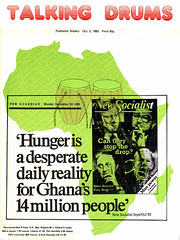Nigeria - Religious Disturbance: Commission Blames Police, N.S.O.
A government white Paper on the Commission's report, released in Maiduguri yesterday said that although the number of deaths were officially put at 175 "other less reliable sources seem to indicate that upwards of 500 people died against the police figure of 132 deaths".
The report said that a witness who testified at the commission said that 32 people died in the police cell instead of four persons officially reported.
According to the report, property worth over 3,000,000 naira were lost to more than 1,000 people during the disturbances.
The Commission blamed the Borno State Commissioner of Police for what it called neglect of duty in allowing the Maitatsine to build up in Bulunkutu, a stone throw from his headquarters, and for not taking serious action against the people involved despite previous reports.
It also blamed the NSO (National Security Organisation) for being rather casual about their primary responsibility for monitoring matters affecting state security.
The Government white Paper however rejected the Commission's recommendation that a state owned police force should be established, adding that control of the Federal police should be left in the more neutral authority as it is the case today.
The White Paper commended the sense with which the commission had viewed the malise into which our whole Koranic education should be re-organised and sufficiently energised so as to make it fit into and fulfil the needs of the fast moving development process in Nigeria.
The six man Commission headed by Alhaji Hassan el-Badaway was set up in November last year to investigate and ascertain the remote as well as the immediate causes of the disturbances.
It was also to ascertain and determine the extent of the loss of lives and destruction of property and the involvement and participation of persons or groups of persons in the disturbances.
Other terms of reference include determining person or persons involved, apportion blame where it is established and recommend ways of preventing future occurrences of such uprising.
